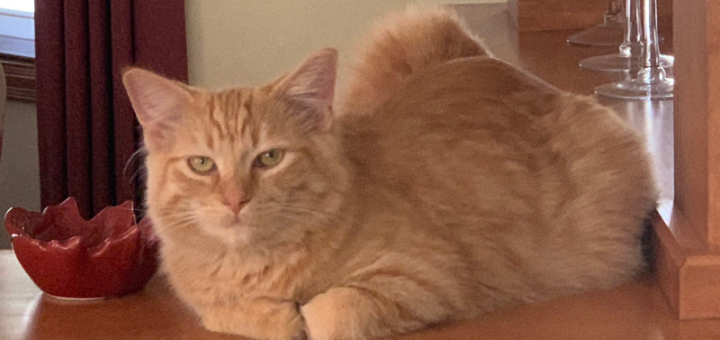
 Copyright 2019 Linda Kracht. All rights reserved.[/caption]
Recently we “inherited” a (temporary) house-cat. The kitty is very easy to live with because he is extremely cute, affectionate, friendly, and entertaining. He makes me wonder about his purpose in life. What is it? And why do we have him?
While raising children, we hosted a variety of pets ranging from the more exotic (gecko) to the more common (dog). But caring for pets always seemed to end in catastrophe — as far as our children were concerned. Our guinea pigs got lockjaw, the fish always got ICK, the gecko swallowed sand and died, the bird died from the flu, and the dog went pure crazy and needed a therapist. (I left him at the Humane Society one day when the kids were at school after feeling that I needed a therapist if he stayed.) So house pets didn’t seem to be our thing. As I write this, I wonder about the fate of this cat and the reason he came into our lives. Perhaps he is here to cure Kyra of her incredible fear of all four legged, furry monsters. Last night Kyra quietly asked: “So, is the cat staying?”
I said, “Yes, for the time being.”
She responded: “Is that fair?”
I replied: “Fair to whom/what?” There was no further adieu.
Why write an article cat for a blog that focuses on spiritual concerns for moms, dads, and families? You shall see.
Bishop Barron (in a talk given a few years ago) likened the relationship animals have with humans to the relationship human beings have with God. Animals are naturally intellectually inferior to humans. We can say that without prejudice or malice. It’s a fact. Don’t believe me? Give the dog a book and tell him to read it. Yet we love them to the moon and back. Like animals, human beings are naturally inferior to our Caretaker Creator God. We should also be able to say that without prejudice or malice or envy. When and if we refuse to accept or believe that we are inferior, He still loves us. Receiving undeserved and unreserved love from God makes us become better people. And this is the takeaway from our animal relationships.
Human interactions with animals actually uplift these creatures to a higher plane within the animal kingdom. They learn things by observing us; things they would not have learned that in the wild while having to rely on instinct alone. We help animals become more aware of themselves. Think of the progress that Jane Goodall made with her gorillas. Similarly, anthropologist Lyn Miles of the University of Tennessee at Chattanooga worked with an orangutan named Chantek and taught him over 150 signs (sign language). He became more self-aware even going so far as to recognize himself in mirrors! Our pets learn from us and their lives improve accordingly.
The same goes for our relationship with God. He brings added purpose to our being. God’s love shows us how to love others more fully. His mercy encourages us to be more merciful. Our desire to live a virtuous life stems from having a personal relationship with God. We learn things about our souls that are not readily apparent when living in the wild. A recent Pew Research Poll found the following:
Copyright 2019 Linda Kracht. All rights reserved.[/caption]
Recently we “inherited” a (temporary) house-cat. The kitty is very easy to live with because he is extremely cute, affectionate, friendly, and entertaining. He makes me wonder about his purpose in life. What is it? And why do we have him?
While raising children, we hosted a variety of pets ranging from the more exotic (gecko) to the more common (dog). But caring for pets always seemed to end in catastrophe — as far as our children were concerned. Our guinea pigs got lockjaw, the fish always got ICK, the gecko swallowed sand and died, the bird died from the flu, and the dog went pure crazy and needed a therapist. (I left him at the Humane Society one day when the kids were at school after feeling that I needed a therapist if he stayed.) So house pets didn’t seem to be our thing. As I write this, I wonder about the fate of this cat and the reason he came into our lives. Perhaps he is here to cure Kyra of her incredible fear of all four legged, furry monsters. Last night Kyra quietly asked: “So, is the cat staying?”
I said, “Yes, for the time being.”
She responded: “Is that fair?”
I replied: “Fair to whom/what?” There was no further adieu.
Why write an article cat for a blog that focuses on spiritual concerns for moms, dads, and families? You shall see.
Bishop Barron (in a talk given a few years ago) likened the relationship animals have with humans to the relationship human beings have with God. Animals are naturally intellectually inferior to humans. We can say that without prejudice or malice. It’s a fact. Don’t believe me? Give the dog a book and tell him to read it. Yet we love them to the moon and back. Like animals, human beings are naturally inferior to our Caretaker Creator God. We should also be able to say that without prejudice or malice or envy. When and if we refuse to accept or believe that we are inferior, He still loves us. Receiving undeserved and unreserved love from God makes us become better people. And this is the takeaway from our animal relationships.
Human interactions with animals actually uplift these creatures to a higher plane within the animal kingdom. They learn things by observing us; things they would not have learned that in the wild while having to rely on instinct alone. We help animals become more aware of themselves. Think of the progress that Jane Goodall made with her gorillas. Similarly, anthropologist Lyn Miles of the University of Tennessee at Chattanooga worked with an orangutan named Chantek and taught him over 150 signs (sign language). He became more self-aware even going so far as to recognize himself in mirrors! Our pets learn from us and their lives improve accordingly.
The same goes for our relationship with God. He brings added purpose to our being. God’s love shows us how to love others more fully. His mercy encourages us to be more merciful. Our desire to live a virtuous life stems from having a personal relationship with God. We learn things about our souls that are not readily apparent when living in the wild. A recent Pew Research Poll found the following:
Actively religious people are more likely than their less-religious peers to describe themselves as very happy in about half of the countries surveyed. Sometimes the gaps are striking: In the U.S., for instance, 36% of the actively religious describe themselves as “very happy,” compared with 25% of the inactively religious and 25% of the unaffiliated. The actively religious are generally less likely than the unaffiliated to smoke and drink. In 11 of the 19 countries, people who attend services at least monthly are less likely than the rest of the population to drink several times a week. People who attend religious services at least monthly often are more likely than “nones” to join other types of (nonreligious) organizations, such as charities and clubs. In the U.S., for example, 58% of actively religious people are also involved in at least one nonreligious voluntary organization, compared with just 51% of the inactively religious and 39% of the unaffiliated. Finally, they noted that the actively religious generally are more likely than others to vote. (Pew Research. January 21, 2019. emphasis mine)This makes sense given the increased awareness that we are loved unconditionally by One who is most perfect. That love and awareness of that love satisfies our hungry hearts. Gratitude begets happiness. A rabbi once urged fellow Jews to list 100 things they were grateful for everyday; this was done in order to grow in gratitude and happiness. He understood that being in relationship with God improves our lives and helps us feel that we matter. Which brings me back to life’s purpose, given the fact that we are naturally inferior to God. Where is the dignity in or purpose of being made less? It’s the start of the seed of gratitude which in proportion to the realization and acknowledgement that a magnificent God still loves us. When/if we reject God as Infinitely More (in every way), then we drift into envy and jealousy and anger (vice) and self worship.
A vision of man and things that is sundered [split] from any reference to the transcendent [God] has led to the rejection of the concept of creation and to the attribution of a completely independent existence to man and nature. (Compendium of the Social Doctrine of the Church 464; emphasis mine) The seventh commandment enjoins respect for the integrity of creation. Animals, like plants and inanimate beings, are by nature destined for the common good of past, present, and future humanity. Use of the mineral, vegetable, and animal resources of the universe cannot be divorced from respect for moral imperatives.” (Catechism of the Catholic Church 2415; emphasis mine) Furthermore, it is the relationship man has with God that determines his relationship with his fellow men and with his environment. This is why the Christian culture has always recognized the creatures that surround man as also gifts of God to be nurtured and safeguarded with a sense of gratitude to the Creator. (Compendium of the Social Doctrine of the Church 464)Our purpose in life matches that of the rest of creation: To give glory to God alone. As creatures made in His image and likeness, human beings are also called to know, love and serve God in unique ways compared to the rest of creation. That entails loving others because of being in relationship with God.
Animals are God's creatures. He surrounds them with his providential care [in and through the care they receive from His human creatures]. By their mere existence, animals bless God and give Him glory. (CCC 2416)And that explains our love affair with animals. And their purpose. Questions to ponder:
- What does CCC 2417 mean when it states that God entrusted animals to the stewardship of those whom he created in his own image?
- Why is it contrary to human dignity to cause animals to suffer unnecessarily?
- Why is it contrary to human dignity to direct animals the affection due only to persons? Explain.
Copyright 2019 Linda Kracht
About the Author

Linda Kracht
Linda is a wife, mother of seven, and grandmother of 23. Linda is founder of Fortifying Families of Faith, LLC and her books include: Daughters Forever, Sons Forever; The Art of Breastfeeding, published by the Couple to Couple League; Mothers Forever, Fathers Forever; Surviving College; Black and White; and A Book for All Seasons.


.png?width=1806&height=731&name=CatholicMom_hcfm_logo1_pos_871c_2728c%20(002).png)
Comments